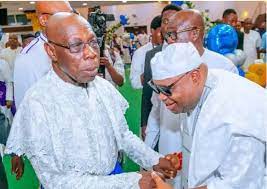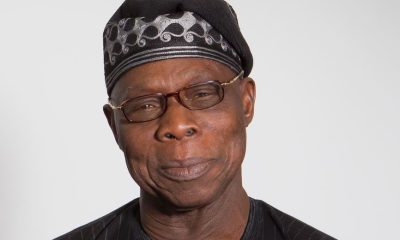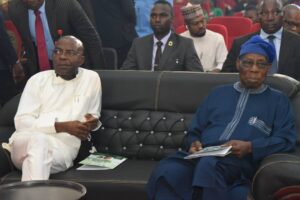POLITICS
How I killed Obasanjo’s Third Term Agenda – Ken Nnamani
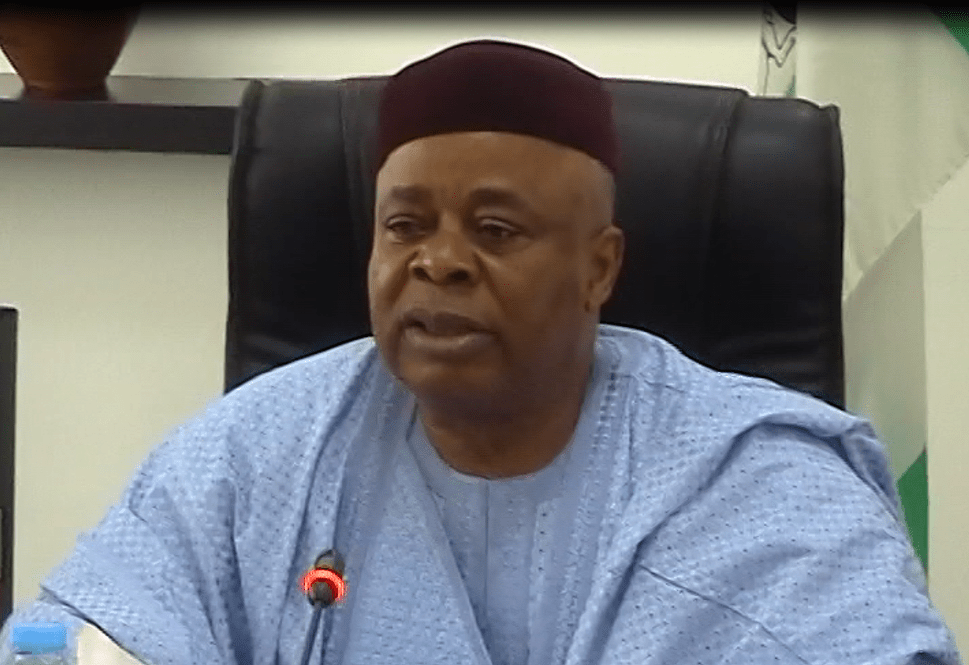
By Jude Opara, Abuja
Former Senate President and chieftain of the All Progressives Congress (APC), Dr. Ken Nnamani, yesterday revealed how he stood against the plan to amend the constitution to pave way for a third term for former President Olusegun Obasanjo.
Nnamani further stated that his model of legislation was shaped by the debate about whether the legislator is an agent or a trustee of the people.
The former Senate President who spoke in Abuja during the official launch of his book titled “Standing strong: Legislative Reforms, Third Term and Other Issues of the 5th Senate”, said he wrote the book with intention not to sensationalize; rather to present a factual account of that defining moment without malice to anyone.
Giving an account of how he aborted the third term agenda, Nnamani said; “During the debate on the Third Term Bid of President Obasanjo, I weighed these two competing concepts of the role of a legislator. I decided to marry the two concepts. I wanted Senators to vote their mind on the question whether to amend the constitution to allow President Obasanjo a Third Term. I also wanted them to effectively represent the views of their constituents. To be an informed trustee, the Senators needed to understand the views of their constituents before casting their votes.
“On this basis, the Senate adjourned to allow Senators to consult with their constituents about the constitutional amendment. With this intervention, some Senators returned to the plenary with enlightened views. Many who were previously overwhelmed with exigencies of politics returned with stories of the vehemence of their constituents. This ‘Damascus experience’ changed the game on the Third Term vote. It was obvious that majority of Nigerians wanted the National Assembly to keep faith with the constitutional limitation on tenure.
“To ensure that Nigerians saw how their representatives were responding to the most important question of democracy, the Senate decided to televise its proceedings. Publicizing the proceedings was faulted by those who wanted to smuggle into the constitution the extension of tenure through undefined and darkly proceedings.
“They knew that if we isolate Nigerians from the proceedings and therefore reduce public pressure on the legislators it could be possible to ram through with their agenda. But I stood strong. The principal officers of the National Assembly stood strong. We overcame this intense pressure even from the highest level of government.
“We continued to broadcast the proceedings. The result of the publicity and openness was that we ultimately secured our democracy.
“The degree of public interest the debate generated owed largely to the decision to televise our deliberations. This was about the origin of the now institutionalized use of television to publicize the proceedings of the National Assembly. The publicity of the proceedings made legislators to sit up and take seriously the art of law-making. No one wanted to be caught on camera either sleeping or making disjointed statements.
“No one wanted to be seen by members of his community taking a disgraceful position on such important issue. Publicly televised proceedings became a new incentive structure to improve the quality of proceedings in the Senate. Suddenly, we gained a new insight into the legislative craft; we were then ready to subject our decisions to public scrutiny.”
Nnamani also lauded his former colleagues for standing by him during the period which said was a trying moment.
“These innovations paid up huge social capital for the National Assembly. Suddenly, the National Assembly became the most credible public institution in Nigeria. The National Assembly became effective, credible, and efficient. Nigerians now came to regard the National Assembly as a collection of patriots devoted to generating laws and legislative framework for economic growth and social inclusion.
“The principal officers of the National Assembly stood strong. We overcame this intense pressure even from the highest level of government. We continued to broadcast the proceedings. The result of the publicity and openness was that we ultimately secured our democracy.”
Continuing, he also advocated for the need to focus on building the strongest and most resilient institutions for the development of democratic values.
“We need to have the best-in-class institutions since economic and social development turns mostly on the quality of institutions. However, recent political experience teaches us that crafty autocrats can rob these institutions of meaning and use them against democracy and development.
“The Third Term Bid was almost a disaster, but for the vigilance and courage of the National Assembly leaders who supported the due process and opposed an invasion of self-serving politicians.”
In his goodwill message, President Muhammadu Buhari who was represented by the Minister of Science and Technology, Dr. Ogbonayan Onu, congratulated Nnamani for his efforts in writing the book. He also assured that the country will continue to fight against insecurity and ensure development of all part of the Nation.
In his comments at the event, Chairman of the event and former Chief Army Staff, General Theophilus Danjuma recommended the book for all intending leaders.
He said; “In my own personal opinion this is a text book for all young men and women who want to run a difficult country like Nigeria.”
POLITICS
Group Backs Tinubu, Urges Sule to Run for Senate
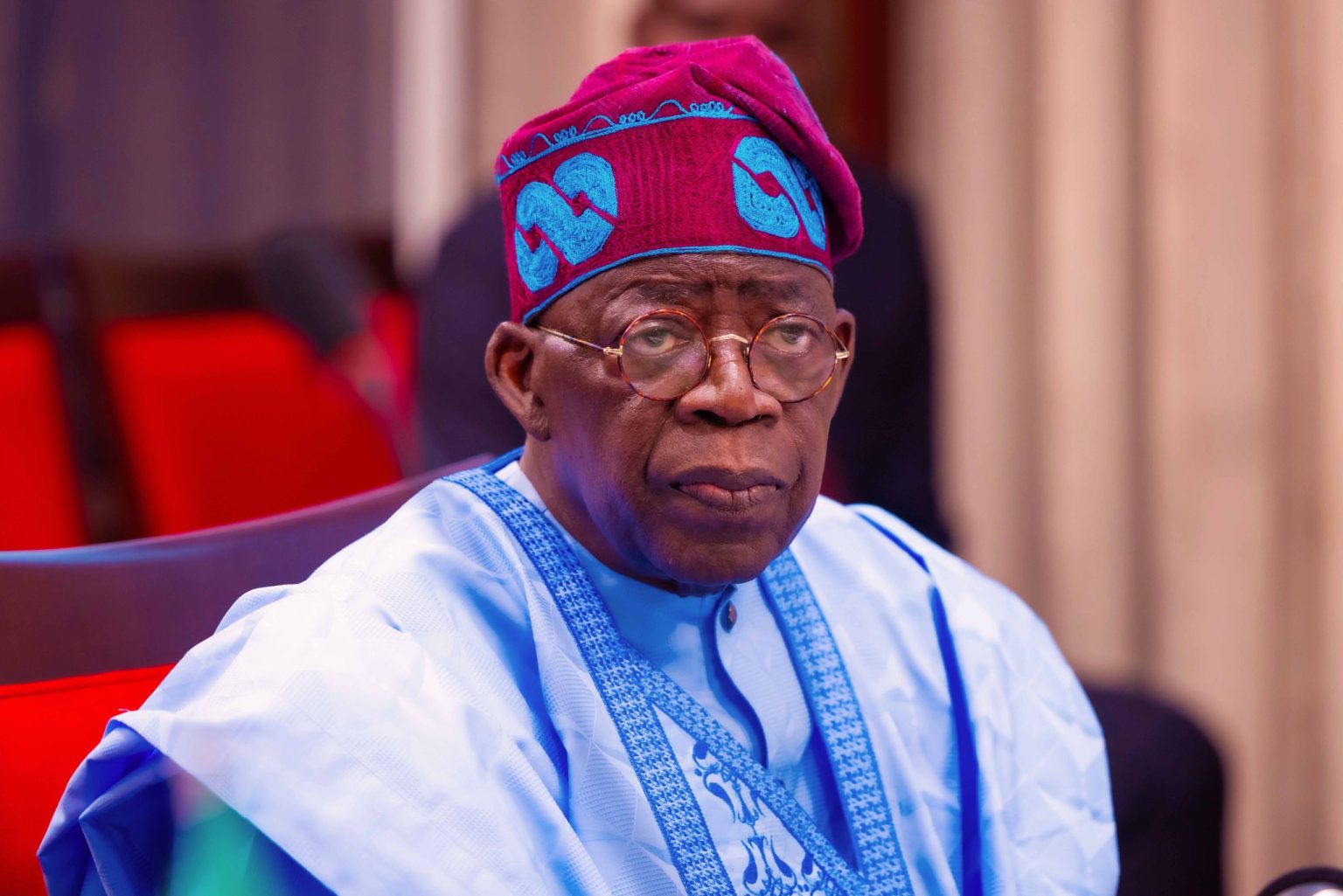
From Abel Zwanke, Lafia
The Chief Executive Officer of the Community Initiative for Character Moulding and Entrepreneurship Development (CiCMED) and Chairman of Keftigga Group, Kefas Elisha Tigga, has reaffirmed support for President Bola Ahmed Tinubu and called on Governor Abdullahi Sule to contest the Nasarawa North Senate seat at the end of his tenure.
Tigga made the call on Sunday during a press conference at the closing ceremony of the Future Planters LEAD Africa Festival 2025 held at Gaji Luxury Hotel, Akwanga.
He described the festival, with the theme “Sowing the Seeds of Change, Harvesting the Future of Africa,” as a major success, noting that it has strengthened the Future Planters Network across Northern Nigeria and the continent.
“This year, we trained hundreds of young people in leadership, agriculture, financial literacy, climate action and entrepreneurship,” he said. “Our network has now grown to over 14,000 members. We are not just planning the future; we are planting and building it.”
Tigga said the country is passing through a challenging period, insisting that Nigerians must support President Tinubu to succeed.
“Anyone who understands leadership knows this is not the easiest season for President Bola Ahmed Tinubu,” he said. “But we choose unity and encouragement. We choose to stand with the President.”
According to him, the administration’s reforms have begun to reflect in economic stability, resource allocation and support for innovation, agriculture and MSMEs.
“This is not the time to tear down the nation with sentiments,” he stated. “This is the time to build together.”
Tigga commended Governor Abdullahi Sule for what he described as “quiet but impactful leadership,” particularly in mining, agriculture, infrastructure and human capital development.
“The story of Nasarawa State cannot be told without your name written in gold,” he said. “As your constitutionally allowed tenure draws near, we in the Future Planters Network urge you to contest for the Senate. This is not retirement; this is deployment.”
He added that Sule’s experience would be valuable in shaping legislation on mining, agriculture, security and youth development.
Tigga expressed gratitude to volunteers, partners, government agencies and supporters of CiCMED’s programmes, while urging youths and development partners to commit to national growth.
“We believe in continuity, sustainability and leadership succession rooted in integrity,” he said. “Together, we will build a stronger Nasarawa, a stronger Nigeria and a rising Africa.”
POLITICS
PDP BoT Vows to Restore Confidence, Holds

By Laide Akinboade, Abuja
The Peoples Democratic Party (PDP) Board of Trustees (BoT), Wike’s fraction on Sunday, vowed to restore confidence of its members across Nigeria.
The BoT Chairman, Sen. Mao Ohuabunwa stated this in Abuja.
Ohuabunwa said arrangements are almost concluded to organize congresses in states where they have not yet been held.
He told members that the national leadership is ready to work collaboratively with all state chapters to bring fresh leadership and stability across the country.
He outlined the PDP’s roadmap: conduct overdue state congresses, consolidate ongoing achievements, and support the national leadership to steer the party back on course.
According to him, these steps are critical to ensuring unity, transparency, and strengthening grassroots engagement.
By holding timely congresses and reinforcing organizational discipline, PDP hopes to rebuild trust among members and present a more organized, credible front ahead of future elections.
POLITICS
LP Reps Accuse Tinubu, APC of Choosing 2027 over Citizens’ Security, Welfare

By Ubong Ukpong, Abuja
The Labour Party Caucus in the House of Representatives has accused President Bola Tinubu and his All Progressives Congress (APC) of prioritizing 2027 politics over the welfare and security of Nigerian citizens.
The caucus said this was insensitive, unconscionable and a clear example of questionable leadership.
It emphasized that while the President’s aspiration for re-election was legitimate, his priority should be addressing the pressing challenges facing Nigerians.
In a statement issued by the Labour Party Caucus leader, Hon. Afam Victor Ogene, in Abuja on Sunday, the lawmakers reiterated that the primary duty of a government is to ensure the welfare and security of its citizens.
However, they criticized the APC and President Bola Tinubu for prioritizing their 2027 reelection bid over these fundamental responsibilities. The statement expressed concern and bewilderment that while the nation grapples with insecurity, the ruling party is either ignoring the issue or offering superficial solutions rather than addressing the problem effectively.These concerns were raised amid escalating insecurity nationwide and the administration’s struggles to fund budgets and demonstrate accountability. “The situation has led to prolonged protests by local contractors who remain unpaid for completed projects, sparking economic hardship, stalled development, and a dearth of new projects.”
Recently, these aggrieved contractors have been holding vigils outside the Ministry of Finance, highlighting the government’s shortcomings.
The Labour Party representatives highlighted that the “Appropriation Act, a law governing budget allocation, has been consistently disregarded by the current administration.” They pointed out the irony of the government pursuing costly projects like the controversial multi-trillion naira coastal road without proper appropriation or procurement processes, while essential federal road infrastructure lies in disrepair. This has raised concerns among citizens, particularly those planning to travel during the festive season, who face not only difficult road conditions but also heightened insecurity.
Also of grave concern is the opaque expenditure of N17.5 trillion, in 2024 alone, on a pipeline-security contract, as revealed in the recently audited accounts of the Nigerian National Petroleum Company, NNPC.
“Nigerians would remember that over a 12-year period, the country spent about N18 trillion on subsidy (which benefitted everyone through affordable transportation and cheaper costs of foodstuffs), but on the excuse of lack of funds to sustain the subsidy regime, this Administration has clearly robbed Peter(Nigerians), to pay Paul(cronies), through a questionable pipeline-security contract whose executors are unknown.”
This statement paints a grim picture of Nigeria’s current state, highlighting concerns about the effectiveness of its government branches. “The executive is seen as underwhelming, the judiciary’s decisions are questioned, and the legislature is criticized for not having the moral fiber to hold the executive accountable.
“Our dear country, Nigeria has become a special economic zone: everyone and everything now has a price. Kidnappers and bandits now have prices on the heads of the citizenry; elected officials now have a price to look the other way; and opposition figures have prices to enthrone chaos in their own platforms. Even the clergy and ulamas are not spared the chicanery of the divisive effects of a gravely monetized polity.
“Pray, Nigerians, we’re in the 12th month of the year, 2025. In fact, across government owned enterprises, ministries, departments, and agencies of government, none can boast of 10 percent of execution of the capital component of the budget. In most cases, the scorecard reads nil.
“Yet everyone carries on, as though this has become the new normal.
Worse is the glaring impunity of relevant officials not bothering to explain to anyone where revenues meant for the implementation of the budget have ‘disappeared’ to.
“Nigeria is on a negative cruise; local contractors occupying the offices of the Federal Ministry of Finance, retired police officers taking over the gates of the National Assembly, while kidnappers freely choose where to strike every single day, yet the only response by government is to launch and distribute vehicles for a purported Renewed Hope Agenda.
So, while the country sits on the precipice, all Mr. President think about is to return to power in 2027.
“Mr. President, while your quest is a legitimate aspiration, please do well to attend to the current stark realities confronting Nigerians.
Besides the parlous state of Nigerian roads – which now ensures that a hitherto six hours journey, from either Lagos or Abuja to the South-South or South East, now takes an entire day to traverse – is the grim reality of possible kidnap which stares every road user in the face.
“Some lawmakers are reflecting on their roles and acknowledging that many are complicit, silenced by potential pecuniary gains. Many have described the 10th Assembly as the worst in Nigeria’s democratic history, reduced to puppetry and rubber-stamping, with no tangible benefits for citizens. They criticize the government for prioritizing economic interests over citizens’ welfare, labeling it “economic banditry.”
“We must not continue on this sorry path. Both the ruling party and opposition must put aside politics and prioritize the people’s welfare. Citizens are the backbone of democracy, and their interests should come above all else.”

